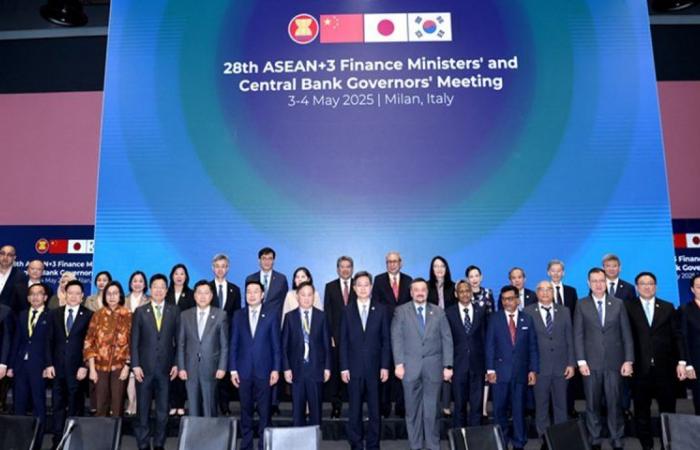Par Hajar Ben Hosain
In a context of global trade tensions, the aggressive policy of the Trump administration in matters of customs duties has had an unexpected effect, that of bringing together with the long divided Asian powers. China, Japan, South Korea and Asean countries now speak with a single voice against American protectionism, a feat that little would have thought possible.
During the 28th meeting of finance ministers and governors of the central banks of the Asean plus three, held on May 4 in Milan, Italy, the members of ASEAN, as well as China, Japan and South Korea, called for a strengthening of regional unity and cooperation in order to deal with increasing uncertainty, in particular the rise in protectionism and the volatility of the world’s financial conditions, according to a common declaration published at the end of Reunion.
This unprecedented statement, which did not directly mention the United States, has occurred while new large-scale American customs duties threatened to hit the Southeast Asia hard. She underlines that the escalation of commercial protectionism weighs on world trade, resulting in economic fragmentation and affecting exchanges, investments and capital flows in the region.
They added that short -term prospects could also be impacted by other external risks, including the tightening of global financial conditions, the slowdown in growth in the main business partners and the reduction of investment flows.
Read also: Cinema: Trump imposes customs duties of 100% on films produced abroad
The joint declaration also stressed that, in a context marked by growing uncertainties and long -term structural transformations, signatories reaffirm their full and whole commitment in favor of multilateralism as well as a multilateral trade system based on rules, non -discriminatory, free, fair, open, inclusive and transparent, having the center of the World Trade Organization (OMC).
In addition, the geopolitical situation in East and Southeast Asia remains marked by increasing tensions between China, Japan, South Korea and the ASEAN countries, due to territorial disputes, military rivalries and economic concerns. For example, faced with the increase in military spending in China and its actions collected as aggressive, several countries in the region strengthen their defense capacities. Japan, in particular, approved a record defense budget of 50.7 billion euros for the financial year 2024-2025, an increase of almost 17 % compared to the previous year.
South Korea and the Philippines also increase their military budgets. The Philippines, for example, invest 35 billion dollars to modernize their army, in response to the territorial claims of China in the Southern China Sea.
In May 2024, China, Japan and South Korea gathered in Seoul for their first tripartite summit in five years. The leaders reaffirmed their commitment to the denuclearization of the Korean peninsula and agreed to strengthen their economic cooperation, in particular by accelerating negotiations for a trilateral free trade agreement.
However, in a context of increasing strategic rivalry between the United States and China, now considered as the main line of geopolitical fracture, neither Japan nor South Korea can define their own trajectory without taking this confrontation between the two major powers into account. Geopolitically, these two neighboring countries play a key role in Asia. Although their future position remains uncertain, they remain dynamic societies, marked by notable advances on the economic, military and technological levels.








